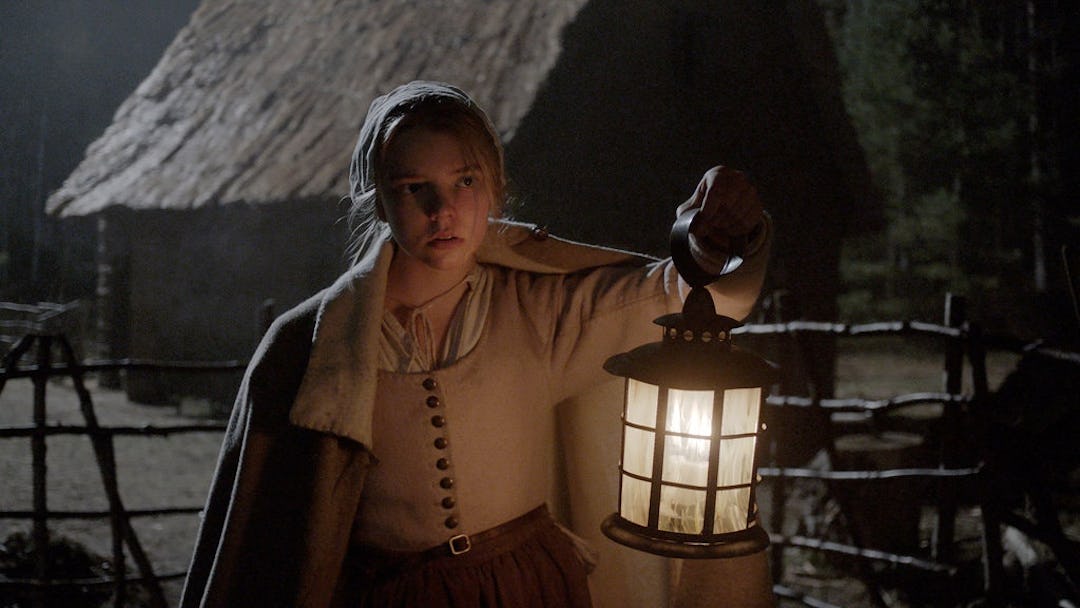The press screening of The Witch fell the night before the kick-off of this year’s Sundance Film Festival, a nice reminder that the indie film scene is basically one long Sundance – because this film premiered all the way back at last year’s fest, and has spent the 12-plus months since accumulating a set of expectations that are nearly impossible to meet. So let’s clear them up now: The Witch is not the scariest movie since It Follows , or The Babadook , or your recent art-house horror flick of choice. In fact, it’s much more “art-house” than “horror,” a deliberately paced, talky period piece that’s remarkably light on outright gore or gimmicky jump-scares. No, what writer/director Robert Eggers pulls off is much more difficult: a film that surrounds you with a general yet mostly indescribable sense of unease, less through its violence or blood than its mood and tension. And then it clobbers you.
It comes subtitled as “a New England folk tale,” and the label is accurate; The Witch has the feeling of ghost stories told around campfires, with little touches added by each successive teller. The time is the 1630s, and the focus is a family of Puritans so devout and unbending in their beliefs that they’re cast out of their village in the opening scenes. “What went we out in this wilderness to find?” thunders patriarch William (Ralph Ineson), and his question is ignored; the family ends up homesteading, out on their own, and soon enough finds the answer to that question.
It’s an extraordinarily bad season for them: bad crops, sick animals, children crashing into puberty, illness, and abduction. The baby is stolen, seemingly from under the nose of eldest daughter Thomasin (Anya Taylor-Joy). Mother Katherine (Kate Dickie) wails and weeps, whispering endless, helpless prayers. Son Caleb (Harvey Scrimshaw) worries the baby can’t get into heaven, as he hadn’t yet been saved. “Let’s not speak on this again,” hisses his father. And then their youngest daughter starts talking about “the witch of the wood.”
She’s right; we’ve seen exactly what that witch did to the baby (and it’s something you won’t un-see anytime soon). But as more strange and inexplicable events occur, the family members begin to turn on each other. Their considerable fears and frustrations come to a head in an extraordinary scene that plays like a combination of awakening, prayer, exorcism, and death, a scene so powerful yet so fragile (one false note and audience giggles break the spell) that you’re afraid to take a breath. And while you’re holding it in, the scene overpowers you.
The entire back third of the picture collects moments like that, as paranoia and terror rip the family to shreds, sometimes literally. But, again, Eggers never goes for the cheap, easy scare; this is a film of unsettling dread and unshakable images, often framed or lit in such a way that you’re not quite sure what you’re seeing… and then suddenly, you’re quite sure, and it’s not pretty.
The delicacy of this balancing act is enabled, to no small degree, by the extraordinary performances. Of particular note are Taylor-Joy, who “pretends” to be the witch with such chilling verve that she tosses the whole movie up in the air, and Ineson, smashingly effective as one of those men so confident in his judgment and faith that it takes a while to notice how hopelessly ineffectual he is, both as a father and a man of God.
And The Witch is one of those films where, looking back, you realize how deliberately and efficiently such conflicts and failures are being teed up. It’s hard to tell exactly where they’re going in those slow-boil early passages, what with all the formal dialogue and nature shots and creepy music… and then, they make it clear. Boy, do they ever.
The Witch is out tomorrow in wide release.
